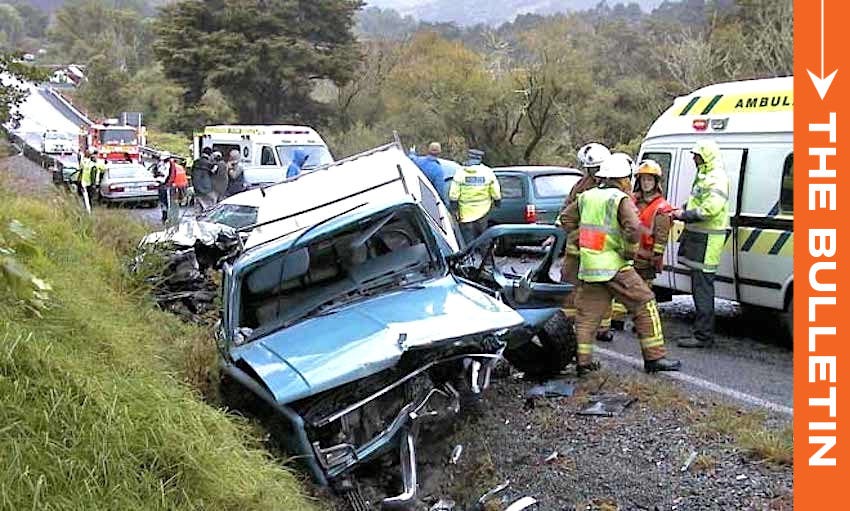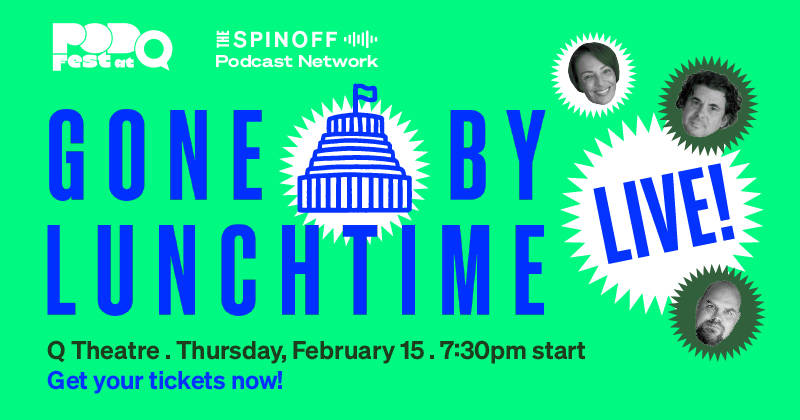A black January on New Zealand's roads
This was the worst January for crash fatalities in five years. Why isn't the Road to Zero strategy making any apparent impact on the road toll?
Mōrena, and welcome to The Bulletin for Thursday, February 1, written by Catherine McGregor.
In today’s edition: New Zealand to ban ‘forever chemicals’ from cosmetics; Swarbrick expected to announce co-leader decision this week; Kelvin Davis jabs at government’s political posturing in valedictory speech. But first, as the government reverses course on speed limits, what will reduce New Zealand shamefully high road toll?
Emergency service personnel attend a serious car crash south of the Brynderwyn Range, Northland, in 2004. (Photo: teara.govt.nz)
After a bad Christmas, an even worse January
It’s been a horrendous month on New Zealand’s roads. The provisional roll toll for January is 36, having increased by two yesterday following a fiery pre-dawn collision that killed both drivers in south Taranaki. This was the worst January for road deaths in five years, weeks after the Christmas holiday period ended with a provisional road toll of 21. That number was on par with last year’s Christmas period, the worst since 2017. Yesterday’s fatalities in Taranaki followed two crashes earlier this week in Oamaru and north Canterbury, killing four. The provisional road toll for 2023 was 341 – an improvement on 2022, but still almost one road death for every day of the year.
Is Road to Zero a failure?
The latest figures are likely to reanimate the ongoing debate about Waka Kotahi’s Road to Zero programme. The road safety strategy was launched in January 2020 with a goal of reducing road deaths to zero by 2050, and by 40% in its first decade, based on 2018’s benchmark of 378 deaths. So how is the strategy doing so far? Terribly, says Press columnist Mike Yardley. “Despite lavishing hundreds of millions of dollars on infantilising advertising campaigns [and] lowering speed limits on hundreds of roads… the promised fatality reductions are not transpiring.” In August Newsroom reported that the government seemed to be backing away from the Road to Zero targets, noting that its overarching land transport safety goal had changed from 2021’s “develop a transport system where no one is killed or seriously injured” to the markedly less ambitious “transport is made substantially safer for all” in 2024.
New government targeting drink and drugs, not speed
The new government also has its doubts about Road to Zero. Under its Tackling Unsafe Speeds programme, rules to make it easier for councils to reduce speed limits came into effect in May – only to be reversed by the new government last month. Transport minister Simeon Brown said the government would come up with a new rule “to ensure that when speed limits are set, economic impacts – including travel times – and the views of road users and local communities are taken into account, alongside safety”. Brown believes the focus should be not on speed, but on drunk and drugged driving. Roadside drug saliva testing was supposed to come into effect in March 2023, but was put on hold because the government could not procure the devices needed. In August, a further 12-month delay to saliva screening was announced, reports Newsroom’s Emma Hatton, who has done incredible work covering the road safety beat.
‘This is not normal’
High road tolls are a deep-rooted New Zealand phenomenon. “This is not a condition of modern life. It’s not normal. It’s an aberration specific to this country,” writes Simon Wilson in the Herald Premium (paywalled). “In 2016, New Zealand had the third-highest rate of road deaths in the developed world. Only Poland and Greece were worse.” There are many reasons for our road fatality record, including a high rate of car usage, unsafe road design, mobile phones, not wearing seatbelts, fatigue, impaired driving – and, evidence shows, the speed at which we drive. For Wilson, Brown’s speed limit u-turn was curiously timed. “What was the minister’s aim, making this announcement just before the busy holiday season? He cannot be intending to signal to motorists that it’s okay to speed.”
See Gone By Lunchtime live at Q Theatre!
Gone By Lunchtime is taking the stage to bring its unique blend of insight, humour and irreverence to a very special live episode. Join The Spinoff’s Toby Manhire, along with Annabelle Lee-Mather (Ngāi Tahu, Ngāti Kahungunu, Ngāti Māmoe) (executive producer of The Hui) and Ben Thomas (former press secretary in the Key government), as they boldly step out of the studio and in front of an audience to cast a curious and caustic eye on New Zealand politics. Don’t miss this rare opportunity to see the 2023 winner of Best Politics Podcast (NZ Podcast awards) brought to life a Q Theatre as part of PodFest at Q.
When and where
7.30pm, Thursday 15th February
Q Theatre Rangatira – 305 Queen St, Auckland CBD
Click here to get your tickets now!
New Zealand to ban ‘forever chemicals’ from cosmetics
The Environmental Protection Agency is to ban polyfluoroalkyl substances (PFAS) from beauty products, in what could be a world-first. From the end of 2026, cosmetics containing PFAS will no longer be able to be made in New Zealand or imported here and will be banned outright a year later. “PFAS are a class of about 14,000 chemicals often used to make products resistant to water, stains and heat and are called ‘forever chemicals’ because they are virtually indestructible,” writes the Guardian’s Eva Corlett. They are also found in some non-stick cookware and waterproof fabrics, and have been linked to cancers, birth defects and negative effects on the immune systems of humans and animals.
Swarbrick expected to announce co-leader decision this week
Auckland Central MP Chlöe Swarbrick could announce she’s running to replace James Shaw as early as today, TVNZ reports. The Green MP says she’s still having “discussions with people who I admire and respect and my caucus colleagues” about whether she should stand, but TVNZ political editor Maiki Sherman says she understands “Swarbrick's candidacy could be announced as soon as tomorrow [Thursday], or potentially pushed out to the end of the week”. RNZ yesterday reported that Swarbrick was “actively considering” a bid and would “make her intentions clear” this week. Nominations for the role opened on January 31 and close on February 14.
The Spinoff is powered by its supporters
In 2023, Spinoff readers funded some of our most beloved, well-read, impactful work. Help Me Hera, The Cost of Being, powerful longreads, Election 2023 coverage, laugh-out-loud satire, Auckland stories, Wellington stories, Christchurch stories and everything in between were powered by Spinoff members and donors. If you did support us, thank you from all of us at The Spinoff. If helping fund well-crafted and insightful journalism is on your list for 2024, donate today or sign up to become a Spinoff member.
Click and Collect
Former Labour minister Kelvin Davis used his valedictory speech to criticise the government for political posturing, including regarding plans for Waitangi next week.
Free rapid antigen tests for Covid-19 (RATs) are being extended to the end of June.
Winston Peters and Judith Collins are in Melbourne for talks today with their Australian counterparts, the first time the two countries have held this kind of “2+2” meeting.
Is the fitness test for new cops too hard? Some police say it is, making it a barrier to recruiting the 500 new officers the government is promising.
Feeling clever? Click here to play 1Q, Aotearoa’s newest, shortest daily quiz.
Former National leader Todd Muller writes in appreciation of his friend James Shaw, who he says embodies the best of New Zealand politics. The Spinoff Review of Books reveals the Ockham New Zealand Book Awards longlist. Pub choir is the most fun you can have with a beer in your hands, argues Claire Mabey. What happened to Slow Horses, the oddball spy drama on Apple TV+ that became a shoot 'em up, wonders Duncan Greive. Let's bring back the remarkable gift of wearing a mask, says Anne Campbell. Is the world about to end? No, it’s just the volunteer firefighters’ siren, writes Liv Sisson.
Sporting snippets
Need a catch-up on Lydia Ko’s incredible start to the LPGA season? Here’s her “red-hot” last few weeks, by the numbers.
In praise of New Zealand Cricket’s strategic vision in keeping cricket on free-to-air TV.
Got some feedback about The Bulletin, or anything in the news? Get in touch with me at thebulletin@thespinoff.co.nz.
If you liked what you read today, share The Bulletin with friends, family and colleagues.












Tons of resources spent on making sure our vehicles are licensed and fit to be operated on our roads year after year, but not a jot towards making sure their operators are similarly roadworthy. Maybe it's about time we got over ourselves and addressed this.
Reckless driving is a part of NZ's ever-present 'wild-west' mentality. TBH the deaths of those engaging in it are no-ones concern other than their own- we could view this as 'Darwinism in action' or 'good riddance to bad rubbish'. The collateral death of innocents is another matter entirely. We could start by removing the offence of 'causing death by careless / dangerous driving' which is an anachronism, and making these into offences of manslaughter / murder respectively.